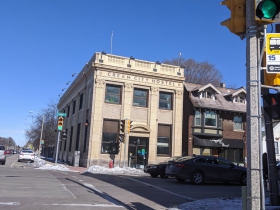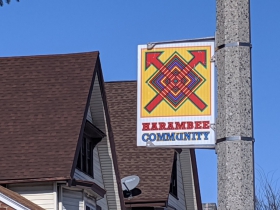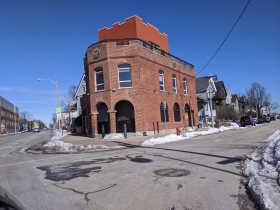Holton Street Named For Abolitionist
Edward Dwight Holton: teetotaler, abolitionist, storekeeper, bank president and public servant.
Edward Dwight Holton, a native of New Hampshire, came to Milwaukee as a 25-year old in 1840, joining about 1,400 people who had arrived within the first five years of the city’s founding. He had some skills that he picked up along the way. He had worked as a teacher, a store clerk, a cashier, and a bookkeeper.
Holton must have brought a little nest egg with him. Enough for him and his partner, Ira E. Goodall, to open a dry goods store at the corner of Wisconsin and Plankinton avenues. They sold about anything fellow residents could want – groceries, hardware, boots and shoes, paints and oils, farm implements, and umbrellas, to name a few. They also paid cash for wheat and hides. If you needed something stored, they could do that too, for a price.
A contemporary, James Buck, described Holton as being of medium height with a large head, blue eyes, light brown hair, and a strong, and loud, New England accent. Buck went on to say that Holton was a good speaker who never passed up a chance to make a speech. He thought that the only way was his way and he wanted to take charge in every situation. He did not drink and did not think anyone else should either. He also made more than his share of enemies.
The previous year, Holton, Kansas was founded in his honor.
Before the Civil War, Wisconsin was a hotbed of anti-slavery sentiments. In 1854, Joshua Glover, a captured runaway slave, was freed from the Milwaukee County Jail in Cathedral Square and sent on his way to freedom in Canada on the “Underground Railroad.” In 1860, a proposal was considered in the Wisconsin legislature to secede from the Union and declare war against the United States over the slavery issue.
Between those events, in 1856, Holton, an ardent abolitionist, headed up the Kansas Emigrant Aid Society. The Kansas Territory had been opened for settlement and supporters and foes of slavery rushed there to help determine whether Kansas would become a slave state or not. Holton and his group led the charge to send some Milwaukee residents to Kansas by offering monetary support to those who would pull up stakes and move there.
Six families and a group of young single men took up the offer. To prepare for their journey, the group spent a week on the Spring Street hill near where the Milwaukee Public Central Library now stands. There they honed their camping skills and learned how to take care of the oxen that would pull their covered wagons and belongings on their crusade.
The journey to Kansas took three arduous months. The travelers had to cut their own road part of the way and had major difficulties in crossing rivers and streams. Once there they found the violence of a mini-Civil War between the opposing settlers which led to the nickname “Bleeding Kansas.” Eventually the anti-slavers won and when Kansas became the country’s 34th state in 1861, it was as a free state.
Holton Hall on the University of Wisconsin – Milwaukee campus is named for Holton. So was the Holton Canal in the Menomonee River Valley, which has since been filled in. His hobby farm, called “Highland Home,” located just north of W. State Street and west of N. 35th Street, was subdivided in 1887 and gave its name to Highland Boulevard.
North Holton Street runs between E. Brady Street and E. Hope Avenue, two blocks north of Capitol Drive. It is a major arterial and is a mix of commercial, industrial, and residential structures.
Along N. Holton Street
Carl Baehr is the author of Milwaukee Streets: The Stories Behind Their Names and From the Emerald Isle to the Cream City: A History of the Irish in Milwaukee.”
If you think stories like this are important, become a member of Urban Milwaukee and help support real, independent journalism. Plus you get some cool added benefits.
City Streets
-
Revised Milwaukee Streets Book Dishes the Dirt
 Nov 3rd, 2025 by Michael Horne
Nov 3rd, 2025 by Michael Horne
-
The Curious History of Cathedral Square
 Sep 7th, 2021 by Carl Baehr
Sep 7th, 2021 by Carl Baehr
-
Gordon Place is Rich with Milwaukee History
 May 25th, 2021 by Carl Baehr
May 25th, 2021 by Carl Baehr




























